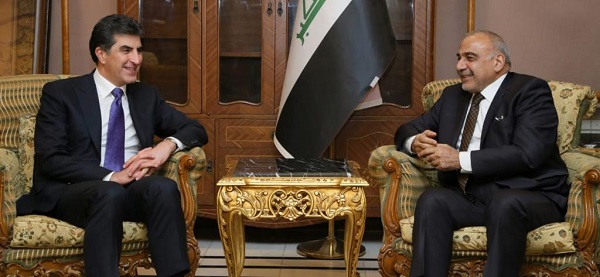Alwaght- As the anti-government protests in Iraq flow down after a month of critical conditions that required the security forces to stay on high alert and even react, now the major issues of the country that have always overshadowed the political scene seem to be resurfacing again. One major issue is the unsettled disputes between the central government and the Kurdish region. Over the past year, the government of Masrour Barzani has pressed extensively to strike a deal with the government of Prime Minister Adel Abdul Mahdi. Whoever, the pro-agreement efforts and negotiations were put on hold as the protests against corruption and poor living conditions have hit the country over the past two months.
Now that the situation is calming, the Kurdish politicians including the president of Kurdish Regional Government (KRG) Nechervan Barzani, have begun to highlight the need to resume the dialogue with Baghdad for a comprehensive accord that will put an end to the disputes that have been standing since the collapse of Saddam Hussein in 2003. The political milieu is now in a way that both Baghdad and Erbil are interested to see a solution to the cases that require a permanent settlement. But the question is that how likely is a deal? To put it differently, what capabilities and obstacles does an Erbil-Baghdad agreement face?
The potentials for an agreement
A settlement for the disputes of the two sides, a demand now 16-years-old, at present has the potentials of materialization more than any other time. Here are some of the capacities for an accord:
1. In the years before 2017, namely before the Kurdish defeat in Kirkuk and loss of the oil-rich city to the Iraqi forces, the KRG judged its power in the military, economy, and security as equal as that of Baghdad government. Such a self-image emboldened it to call for even-leveled negotiations with the central government, much like two independent states discussing a contentious matter. After the ISIS emergence in the country, the Kurdish government stepped up its pro-independence campaign. But this strategy failed as Baghdad reacted severely to a referendum arranged by the former KRG president Masood Barzani who shrugged off all of the opposition voices to his plan even by his Western allies. Now, the autonomous region’s politicians have faced the realities and they seem to be more eager than before for an agreement with Baghdad.
2. The Kurdish leaders are very well aware that they now have very limited trump cards in the negotiations with the central government. They know that Adel Abdul Mahdi’s government has an upper hand now. The most effective play card of the PM is the budget that is becoming a nightmare for Erbil. This is a very powerful bargaining chip in the hands of Baghdad that makes Barzani ready to offer special concessions to the PM all so that at least save the flow of cash under the budget share to the northern region.
3. We can also refer to personal and leadership roles in politics. Presently Abdul Mahdi is peculiarly close to the Kurds in the north. His historical friendship with the Kurds, especially during the struggle against the rule of Saddam Hussein before 2003, provide common grounds for constructive talks.
4. Furthermore, the government of Kurdistan wants a permanent solution to the disputes. It, underwent hard times as a result of Baghdad’s reduction of its share from the national budget to one-fourth between 2014 and 2019, does not want to re-experience such a predicament. That is why it backs an agreement between Baghdad and Erbil.
The obstacles ahead of an agreement
Although the ground for talks and an agreement is prepared more than any other time, there are obstacles that can potentially blockade an accord between Erbil and Baghdad.
1. So far, the KRG has not yielded to a demand by Baghdad to hand over the oil facilities and pipelines in its territories to the Iraqi oil marketing government, known as SOMO. The Kurdish region asks for a kind of independence in marketing and selling the oil, something in contrast to the Iraqi national sovereignty.
2. The Kurds still want the implementation of article 140 of the national constitution that asks for a solution for the dispute of control over regions like Kirkuk, Mosul, Salahaddin, and Diyala. But Baghdad wants them to abandon their calls surrounding the disputed regions.
3. A large part of the Iraqi political parties now active in the country’s politics do not approve of give and take of concessions between Baghdad and Erbil. They warn that such dealing poses a threat to Iraq’s territorial integrity. This is another hurdle ahead of the grand agreement with Baghdad.



























